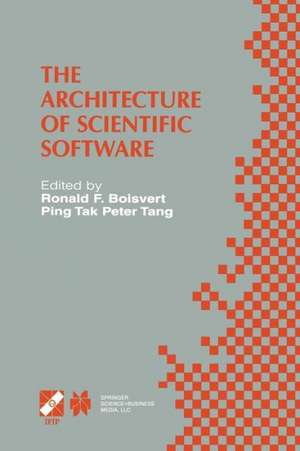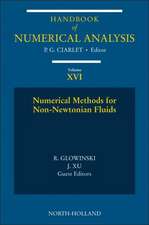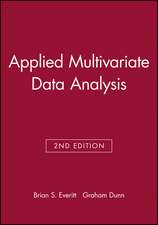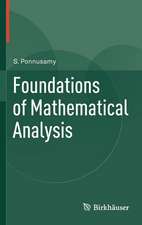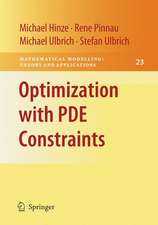The Architecture of Scientific Software: IFIP TC2/WG2.5 Working Conference on the Architecture of Scientific Software October 2–4, 2000, Ottawa, Canada: IFIP Advances in Information and Communication Technology, cartea 60
Editat de Ronald F. Boisvert, Ping Tak Peter Tangen Limba Engleză Paperback – 14 apr 2013
Software architecture refers to the way software is structured to promote objectives such as reusability, maintainability, extensibility, and feasibility of independent implementation. Such issues have become increasingly important in the scientific domain, as software gets larger and more complex, constructed by teams of people, and evolved over decades. In the context of scientific computation, the challenge facing mathematical software practitioners is to design, develop, and supply computational components which deliver these objectives when embedded in end-user application codes.
The Architecture of Scientific Software addresses emerging methodologies and tools for the rational design of scientific software, including component integration frameworks, network-based computing, formal methods of abstraction, application programmer interface design, and the role of object-oriented languages.
This book comprises the proceedings of the International Federation for Information Processing (IFIP) Conference on the Architecture of Scientific Software, which was held in Ottawa, Canada, in October 2000. It will prove invaluable reading for developers of scientific software, as well as for researchers in computational sciences and engineering.
| Toate formatele și edițiile | Preț | Express |
|---|---|---|
| Paperback (1) | 1275.89 lei 6-8 săpt. | |
| Springer Us – 14 apr 2013 | 1275.89 lei 6-8 săpt. | |
| Hardback (1) | 1282.32 lei 6-8 săpt. | |
| Springer Us – 30 apr 2001 | 1282.32 lei 6-8 săpt. |
Din seria IFIP Advances in Information and Communication Technology
- 20%
 Preț: 170.51 lei
Preț: 170.51 lei - 20%
 Preț: 615.74 lei
Preț: 615.74 lei - 20%
 Preț: 340.32 lei
Preț: 340.32 lei -
 Preț: 397.38 lei
Preț: 397.38 lei - 20%
 Preț: 336.02 lei
Preț: 336.02 lei - 20%
 Preț: 340.98 lei
Preț: 340.98 lei - 20%
 Preț: 503.41 lei
Preț: 503.41 lei - 17%
 Preț: 523.40 lei
Preț: 523.40 lei - 20%
 Preț: 502.06 lei
Preț: 502.06 lei - 17%
 Preț: 488.96 lei
Preț: 488.96 lei - 20%
 Preț: 501.04 lei
Preț: 501.04 lei - 20%
 Preț: 403.20 lei
Preț: 403.20 lei - 15%
 Preț: 708.83 lei
Preț: 708.83 lei - 20%
 Preț: 1162.12 lei
Preț: 1162.12 lei - 20%
 Preț: 1288.25 lei
Preț: 1288.25 lei - 18%
 Preț: 1227.21 lei
Preț: 1227.21 lei - 20%
 Preț: 1282.00 lei
Preț: 1282.00 lei - 18%
 Preț: 1224.18 lei
Preț: 1224.18 lei - 18%
 Preț: 953.03 lei
Preț: 953.03 lei - 18%
 Preț: 953.20 lei
Preț: 953.20 lei - 18%
 Preț: 944.99 lei
Preț: 944.99 lei - 18%
 Preț: 948.29 lei
Preț: 948.29 lei - 15%
 Preț: 645.47 lei
Preț: 645.47 lei - 18%
 Preț: 960.13 lei
Preț: 960.13 lei - 20%
 Preț: 1288.11 lei
Preț: 1288.11 lei - 20%
 Preț: 998.70 lei
Preț: 998.70 lei - 18%
 Preț: 949.23 lei
Preț: 949.23 lei - 20%
 Preț: 1283.81 lei
Preț: 1283.81 lei - 20%
 Preț: 995.89 lei
Preț: 995.89 lei - 15%
 Preț: 645.79 lei
Preț: 645.79 lei - 20%
 Preț: 1276.74 lei
Preț: 1276.74 lei - 20%
 Preț: 1922.99 lei
Preț: 1922.99 lei - 20%
 Preț: 1285.97 lei
Preț: 1285.97 lei - 18%
 Preț: 956.69 lei
Preț: 956.69 lei - 18%
 Preț: 946.72 lei
Preț: 946.72 lei - 18%
 Preț: 1224.36 lei
Preț: 1224.36 lei - 20%
 Preț: 1277.89 lei
Preț: 1277.89 lei - 18%
 Preț: 953.03 lei
Preț: 953.03 lei - 18%
 Preț: 947.98 lei
Preț: 947.98 lei - 20%
 Preț: 1292.54 lei
Preț: 1292.54 lei - 18%
 Preț: 956.18 lei
Preț: 956.18 lei - 20%
 Preț: 645.79 lei
Preț: 645.79 lei - 18%
 Preț: 1235.25 lei
Preț: 1235.25 lei - 20%
 Preț: 1284.47 lei
Preț: 1284.47 lei - 18%
 Preț: 1231.01 lei
Preț: 1231.01 lei - 20%
 Preț: 993.09 lei
Preț: 993.09 lei - 20%
 Preț: 1288.94 lei
Preț: 1288.94 lei - 20%
 Preț: 987.17 lei
Preț: 987.17 lei - 18%
 Preț: 1833.33 lei
Preț: 1833.33 lei
Preț: 1275.89 lei
Preț vechi: 1594.86 lei
-20% Nou
Puncte Express: 1914
Preț estimativ în valută:
244.14€ • 255.55$ • 203.20£
244.14€ • 255.55$ • 203.20£
Carte tipărită la comandă
Livrare economică 31 martie-14 aprilie
Preluare comenzi: 021 569.72.76
Specificații
ISBN-13: 9781475767193
ISBN-10: 1475767196
Pagini: 384
Ilustrații: XXIV, 360 p.
Dimensiuni: 155 x 235 x 20 mm
Greutate: 0.54 kg
Ediția:Softcover reprint of the original 1st ed. 2001
Editura: Springer Us
Colecția Springer
Seria IFIP Advances in Information and Communication Technology
Locul publicării:New York, NY, United States
ISBN-10: 1475767196
Pagini: 384
Ilustrații: XXIV, 360 p.
Dimensiuni: 155 x 235 x 20 mm
Greutate: 0.54 kg
Ediția:Softcover reprint of the original 1st ed. 2001
Editura: Springer Us
Colecția Springer
Seria IFIP Advances in Information and Communication Technology
Locul publicării:New York, NY, United States
Public țintă
ResearchCuprins
I Large-Scale Systems Integration.- Network-Based Scientific Computing.- Future Generations of Problem—Solving Environments.- Developing an Architecture to Support the Implementation and Development of Scientific Computing Applications.- PETSc and Overture: Lessons Learned Developing an Interface between Components.- Component Technology for High-Performance Scientific Simulation Software.- A New Approach to Software Integration Frameworks for Multi-physics Simulation Codes.- Code Coupling using Parallel CORBA Objects.- A Collaborative Code Development Environment for Computational Electro-magnetics.- II The Architecture of Components.- On the Role of Mathematical Abstractions for Scientific Computing.- Object-oriented Modeling of Parallel PDE Solvers.- Broadway: A Software Architecture for Scientific Computing.- Formal Methods for High-Performance Linear Algebra Libraries.- New Generalized Matrix Data Structures Lead to a Variety of High-Performance Algorithms.- A Comprehensive DFT API for Scientific Computing.- Using A Fortran Interface to POSIX Threads.- Data Management Systems for Scientific Applications.- Software Components for Application Development.- Hierarchichal Representation and Computation of Approximate Solutions in Scientific Simulations.- Software Architecture for the Investigation of Controllable Models with Complex Data Sets.- A Mixed-Language Programming Methodology for High Performance Java Computing.- III Conference Information.- The Architecture of Scientific Software: the Conference.
